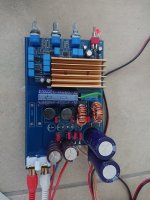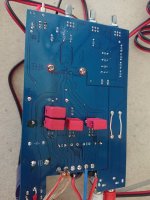So let us found a trioThat makes three of us.
As long as the caps are not electrolytic and transfer the audio signal, you will not have any noticeable change in sound. But even electrolytics not all sound bad/different to film foil MKT MKP, MKS.
Very often you can reduce the capacity if you change from electrolytic to MKx. Like 2.2uF or 1uF instead of 10uF. If you go too small, bass will suffer. If you know the resistors around the C, you can easily calculate -3dB point.
In the end you will need very good speaker (tweeter) to notice any difference at all. One point is long therm reliability. Electrolytics fail sometimes over time, I never had this with film capacitors. On the other side, a few days ago I tested 7 ROE electrolytics from 1980. They still had their rated capacity at the upper tollerance and all where with a few %.
With D-amps temperatures are reduced in general, while C´s where often quite hot in A/B amps, so they even might last longer now.
Very often you can reduce the capacity if you change from electrolytic to MKx. Like 2.2uF or 1uF instead of 10uF. If you go too small, bass will suffer. If you know the resistors around the C, you can easily calculate -3dB point.
In the end you will need very good speaker (tweeter) to notice any difference at all. One point is long therm reliability. Electrolytics fail sometimes over time, I never had this with film capacitors. On the other side, a few days ago I tested 7 ROE electrolytics from 1980. They still had their rated capacity at the upper tollerance and all where with a few %.
With D-amps temperatures are reduced in general, while C´s where often quite hot in A/B amps, so they even might last longer now.
Last edited:
As long as the caps are not electrolytic and transfer the audio signal, you will not have any noticeable change in sound.
Is this a fact or subjective?
I'm in for a quartett.So let us found a trio

These are "can be" facts. Not all capacitors are the same. Not with there objective electric data and not with their sound.
I do admit the effect is often overestimated, this is true, mostly to sell ridiculous overpriced “audiophile” parts. But if you say there does not exist any "sound" at all, this may only show you where so lucky never to hear "bad", not for audio suited capacitors.
If you build a high quality loudspeaker with a 6dB high pass and a very good tweeter, changing the only capacitor in a passive x-over will show, in a blind test, that differences exist, which are not based on capacitance. You are welcome to test your self. You don´t need any expensive gear for that.
When I started with DIYS HIFI I thought very technical and believed most fuzz about parts quality was nonsense. I hoped so, too, because if you are on a budget, you are are happy to save on parts.
Then, over the years I had many experiences, where single parts or even wires, mattered a lot, as they degraded the sound significantly.
Don´t get me wrong, there where often even cheaper parts that sounded better than a mid priced one, but as end user, you can never be sure what a part is really worth or costs, as the traders calculate not anything alike. So in some rare cases, changing a single part was simply audible.
Testing with 6dB x-overs convinced me that capacitor sound does exist, I did these tests with two friends, that where civil engineers and on the "no voodoo" side of the game, just like me.
An anecdote from these tests: When a friend of mine bought a very exclusive loudspeaker kit, he paid a premium for the “High End” x-over parts. We took the most expensive capacitor and wanted to hear the “huge impact” the dealer promised. It was 2.2 uF if I remember right. I wired up a double switch, so we could flip between two DUT´s with no time delay and invisible for the auditors.
The result was absolutely clear: The high price capacitor did not sound better than others, most sounded exactly the same. Only a few bipolar electrolytic sounded really worse, but not all of them.
In the end, a surplus capacitor taken from an electric AC motor sounded better than all others, easily audible in blind A/B testing. The capacity was measured and no tolerance over 5% allowed in the test.
Not one of us had expected this outcome. Today I try to avoid electrolytic capacitors in the signal path, even as I do admit this might not be the only truth, but as I never found a film capacitor that disturbed the sound. I trust them most.
I use mostly quality industry parts from brands like ROE, Wima, Frako, Ero, Wego, F&T, Vishay, BC, Panasonic and the like, most bought in large amounts from surplus stores, years ago. As I measure any part I use, I can truly tell, tolerances with industrial grade parts are really surprisingly low.
I do admit the effect is often overestimated, this is true, mostly to sell ridiculous overpriced “audiophile” parts. But if you say there does not exist any "sound" at all, this may only show you where so lucky never to hear "bad", not for audio suited capacitors.
If you build a high quality loudspeaker with a 6dB high pass and a very good tweeter, changing the only capacitor in a passive x-over will show, in a blind test, that differences exist, which are not based on capacitance. You are welcome to test your self. You don´t need any expensive gear for that.
When I started with DIYS HIFI I thought very technical and believed most fuzz about parts quality was nonsense. I hoped so, too, because if you are on a budget, you are are happy to save on parts.
Then, over the years I had many experiences, where single parts or even wires, mattered a lot, as they degraded the sound significantly.
Don´t get me wrong, there where often even cheaper parts that sounded better than a mid priced one, but as end user, you can never be sure what a part is really worth or costs, as the traders calculate not anything alike. So in some rare cases, changing a single part was simply audible.
Testing with 6dB x-overs convinced me that capacitor sound does exist, I did these tests with two friends, that where civil engineers and on the "no voodoo" side of the game, just like me.
An anecdote from these tests: When a friend of mine bought a very exclusive loudspeaker kit, he paid a premium for the “High End” x-over parts. We took the most expensive capacitor and wanted to hear the “huge impact” the dealer promised. It was 2.2 uF if I remember right. I wired up a double switch, so we could flip between two DUT´s with no time delay and invisible for the auditors.
The result was absolutely clear: The high price capacitor did not sound better than others, most sounded exactly the same. Only a few bipolar electrolytic sounded really worse, but not all of them.
In the end, a surplus capacitor taken from an electric AC motor sounded better than all others, easily audible in blind A/B testing. The capacity was measured and no tolerance over 5% allowed in the test.
Not one of us had expected this outcome. Today I try to avoid electrolytic capacitors in the signal path, even as I do admit this might not be the only truth, but as I never found a film capacitor that disturbed the sound. I trust them most.
I use mostly quality industry parts from brands like ROE, Wima, Frako, Ero, Wego, F&T, Vishay, BC, Panasonic and the like, most bought in large amounts from surplus stores, years ago. As I measure any part I use, I can truly tell, tolerances with industrial grade parts are really surprisingly low.
What do you think about replace all 1uF caps for the OPAs? Because of the footprint only MKS will fit. Will it be the better way?
Some people will say no difference, some will say yes difference. There's only one way to find out - and that's Do It Yourself.
Let us know what you find out.
Has anyone looked into this TPA3255D product from Fosi?
M03 Subwoofer Amplifier 300 Watt Mini Mono Audio Amp Full-Frequency an
– Fosi Audio
M03 Subwoofer Amplifier 300 Watt Mini Mono Audio Amp Full-Frequency an
– Fosi Audio
300W amp with a 160W power supply.
Has anyone looked into this TPA3255D product from Fosi?
M03 Subwoofer Amplifier 300 Watt Mini Mono Audio Amp Full-Frequency an
– Fosi Audio
TPA3255 wit WIMA MKP2 outputfilter. Sound is amazing. I'am very happy.
From where did you buy this ?
Hope you have only done the modification mentioned on What is wrong with TPA3255?
The amp is really good and cheap.
It must be magical.
Most certainly a candidate for the next Nobel prize in physics
Best regards!
- Home
- Amplifiers
- Class D
- TPA3255 - all about DIY, Discussion, Design etc


